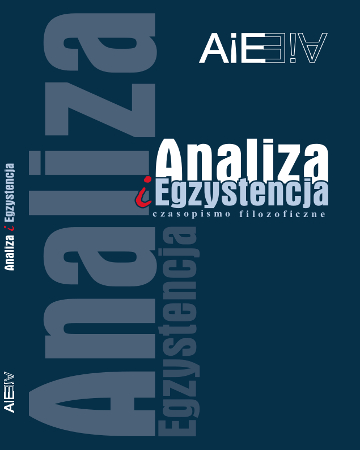
ISSN: 1734-9923
eISSN: 2300-7621
OAI
DOI: 10.18276/aie.2018.44-01





Issue archive /
44 (2018)
Utylitaryzm reguł, znaczenie intencji i ocena terroryzmu (Rule utilitarianism, relevance of intention and moral permissibility of terrorism)
(Rule Utilitarianism, Relevance of Intention, and Moral Permissibility of Terrorism)
| Authors: |
Wacław
Janikowski

Zakład Etyki, Instytut Filozofii, Uniwersytet Szczeciński, ul. Krakowska 71, 71-017 Szczecin |
| Keywords: | ethics intention Jeff McMahan Principle of Double Effect terrorism utilitarianism |
| Data publikacji całości: | 2018 |
| Page range: | 19 (5-23) |
Abstract
Rule utilitarianism, relevance of intention and moral permissibility of terrorism
In this paper I consider the puzzling question of moral responsibility of some quite specific terrorist acts. One distinguishable, but highly controversial, example of such a case may be the allied terror-bombing of German cities by English and American forces during the end of World War II, with so many civilian victims. I propose strict definition of terrorism, and after that, go on with the question: Is it really so obvious and certain that all acts of terrorism are impermissible on moral grounds? Then I investigate the relevance of intention for moral evaluation of any case of terrorism. In these matters I get involved in dispute with Jeff McMahan’s thesis that all acts of terrorism are inherently morally wrong and impermissible, and criticize his employment of the Principle of Double Effect.
Download file
Article file
Bibliography
| 1. | Adams, R. (2003). Motive Utilitarianism. W: S. Darwall (red.), Consequentialism (s. 236-250). Malden: Blackwell Publishing. |
| 2. | Coady, C.A.J. (2004a). Terrorism and Innocence. The Journal of Ethics, 8, 1, 37-58. |
| 3. | Coady, C.A.J. (2004 b). Terrorism, Morality, and Supreme Emergency. Ethics 2004, 114, 781-787. |
| 4. | Garrett, S.A. (1993). Ethics and Airpower in World War II: The British Bombing of German Cities. New York: St. Martin’s. |
| 5. | Honderich, T. (2003). After the Terror: a Book and Further Thoughts. The Journal of Ethics, 7, 161-181. |
| 6. | Janikowski, W. (2008). Naturalizm etyczny we współczesnej filozofii analitycznej. Warszawa: Wydawnictwo Naukowe Semper. |
| 7. | Janikowski, W. (2013). Zasada Podwójnego Skutku, Zasada Moralnej Symetrii i kwestia legalizacji eutanazji. Analiza i Egzystencja, 22, 125-138. |
| 8. | Kagan, S. (1989). The Limits of Morality. Oxford: Oxford University Press. |
| 9. | Lazar, S., Frowe, H. (red.) (2018). The Oxford Handbook of Ethics of War. Oxford: Oxford University Press. |
| 10. | Lazari-Pawłowska, I. (1986). Warunkowe i bezwarunkowe obowiązywanie norm moralnych. Etyka, 22, 7-18. |
| 11. | Lazari-Pawłowska, I. (1992). Problemy etyki sytuacyjnej. W: Lazari-Pawłowska, I., Etyka. Pisma wybrane. Wrocław: Zakład Narodowy im. Ossolińskich. |
| 12. | McMahan, J. (2009). Intention, Permissibility, Terrorism, and War. Philosophical Perspectives, 3, 345-373. |
| 13. | Nagel, T. (1979). Mortal Questions. Cambridge: Cambridge University Press. |
| 14. | Nathanson, S. (2010). Terrorism and the Ethics of War. Cambridge: Cambridge University Press. |
| 15. | Primoratz, I. (1990). What is Terrorism?. Journal of Applied Philosophy, 7, 129-138. |
| 16. | Ross, W.D. (1930). The Right and the Good. Oxford: Clarendon Press. |
| 17. | Sinnott-Armstrong, W. (1991). On Primoratz’s Definition of Terrorism. Journal of Applied Philosophy, 8, 1, 115-120. |
| 18. | Smart, J.J.C. (1987). Extreme and Restricted Utilitarianism. W: Smart, J.J.C., Essays Metaphysical and Moral. Selected Philosophical Papers. Oxford: Basil Blackwell, 262-267. |
| 19. | Tadros, V. (2016). Wrongs and Crimes. Oxford: Oxford University Press. |
| 20. | Thomson, J.J. Self-Defense. Philosophy and Public Affairs, 20, 4, 283-310. |
| 21. | Walzer, M. (2000). Just and Unjust Wars: A Moral Argument with Historical Illustrations. New York: Basic Books. |